- Home
- Peter Grainger
Luck and Judgement
Luck and Judgement Read online
LUCK AND JUDGEMENT
A D C SMITH INVESTIGATION
Peter Grainger
Chapter One
A gust of wind that must have been the strongest yet lifted the helicopter nose first. As a result, the horizon dipped and tilted to the left before disappearing completely for a long moment, and he felt his stomach, or what was left of it, follow suit. He didn’t glance to the side, to any of his travelling companions in the short row of seats – he didn’t want to see their faces and he certainly didn’t want anyone to see the expression that must be on his own. More than once he had tried closing his eyes but that seemed to make matters worse, if such a thing was possible. Just under half an hour, the young female attendant had said back at the airfield, just a short hop to one of the closest platforms that we service. And, she had added, you have a nice morning for it.
So this is what they consider a nice morning out on the North Sea. A short hop? It felt like an eternity already. Had the girl seen the nervousness in his face? He didn’t think so because he hadn’t felt it until the beast took off and began to sway across the waves, too fast and too low, heading into the gale that had sprung up as soon as they left the shelter of the East Denes airstrip. He had almost been looking forward to it, had said to himself at five o’clock that morning that this was the kind of variety he had hoped for when he joined the service, no office routines, no nine ‘til five, a challenge every day and no two jobs the same… And it wasn’t as if he hadn’t flown before, plenty of times on family holidays to the Med and later to America when his dad began to make the serious money. That was on the great airliners though, and even the European trips had been on nice, comfortable planes with smartly dressed pilots and co-pilots and tall, blonde, competently smiling stewardesses. Nice, comfortable planes that sometimes flew through a little turbulence and everyone looked around and smiled at each other as if to say, what an adventure we’re having!
The horizon swung back into view and levelled out. He had noticed the pilot briefly as he climbed in, noticed that he was not wearing a blue uniform with any gold braid, and he didn’t have a peaked cap either. In fact, on reflection, he looked rather young and a little wild in some sort of World War Two leather jacket over his bright orange survival suit. Waters looked down at the identical one that covered his own clothing and thought, well, that says it all, really. This is so dangerous that they won’t let you fly in it unless you’re wearing the appropriate get-up for a crash; on top of that you have to watch a twenty minute video about how to cope in the event of a crash, and if you are a frequent flyer you’ll have to do regular drills upside down in a swimming pool so that you know what to do when it does eventually crash. He took a quick glance around inside the helicopter. Most of the notices and objects on the inside were about crashing as well. It was a Sikorsky something, he remembered that much, but Smith would probably tell him off if he could not repeat back the exact model number and shade of grey.
A notch had appeared in the horizon – quite a large notch, and Waters realized that they were moving deceptively quickly across the sea now that there was a reference point. It must be platform Elizabeth, call sign Echo 1, but beyond it he could also make out other rigs and installations, like an industrial estate far out at sea. A few more minutes then and this flight at least would be over. Perhaps the wind would have dropped by the time they made the return in the afternoon.
He breathed deeply a couple of times, hoping that his complexion wouldn’t be worse than a faint yellow when they disembarked, and took a look to his right. Smith had his eyes fixed firmly on the gas platform that was steadily growing larger ahead of them, a look of concentration on his face. If he realized that Waters was watching him, he did not show it. In the two seats directly in front of them sat two officers that Waters had met for the first time less than two hours before; DCI Cara Freeman and her sergeant Terry Christopher, both from the new Regional Serious Crimes Unit. Four officers, two of them specialists ones, to look into this seemed a disproportionate response, at least initially, and he had said as much to Smith while they waited in the departure room, watching footage of sinking helicopters. Then Smith had explained that any incident on an oil or gas rig beyond the obviously trivial was viewed as a potential offshore security threat. The disappearance of a worker was beyond the obviously trivial and so here they all were. The assumption was that it was not a hostage-taking, that there had been some sort of an accident and it would be left to the local bobbies – that’s you and me, Smith had said – to sort it out, RSCU then riding off into the sunset of everyone else’s ambitions. The way that Smith had said the very word ‘assumption’ was enough to remind Waters of the several warnings he had already been given about making such things.
That Smith and the DCI had met before was clear enough but inter-unit relations were not exactly warm as far as Waters could tell. There had been a brief discussion about the plan for the day and about the bare facts, and then nothing more. Waters had tried to catch Smith’s eye with a raised eyebrow of his own but no further explanation had been given – the four of them passed some minutes in silence during the final wait for the Sikorsky to take off. Waters himself had attempted some conversation beforehand with the sergeant but he soon understood that the apparently friendly smile from the round, bespectacled face was actually one of pity. Waters had no idea why he was being pitied – it might be for his own choice of sergeant or simply for the fact that he was not a member of the RSCU, or some other arcane aspect of life in the modern police service that he had not yet grasped. Christopher was not many years older than Waters, somewhat overweight but very sharply shaved and suited; he was happy with all of that, Waters concluded, because they all made it clear to the world that Terry Christopher was not here to chase car thieves or even to arrest arsonists – Terry Christopher was here and had been recruited into the RSCU because he was very bright and very ambitious, that was all.
The pilot said something through the intercom. Waters didn’t catch the exact words but it obviously meant that they were coming in to land, in a manner of speaking. Somehow the pilot was going to put this thing down on the tiny, circular helideck that was perched on one end of the platform like an oversized dinner plate – it didn’t look much bigger than the real thing at the moment. Beneath it, the waves, the huge, grey-green, white-crested waves, rose more than half way up the great tubes of steel that had been driven deeply into the sea bed. The waves rose up and slithered down again, the water boiling away under the platform in some mysterious and apparently endless rage. The young detective closed his eyes for a moment and pictured the pilot at the controls, doing this day in and day out, wearing what must be his lucky leather jacket.
Then a voice said calmly, ‘And stand by…’
Every seat had been taken on the helicopter. When Waters had telephoned to confirm the arrangements the previous afternoon, the junior executive had made it plain that four key workers would have to take a later flight as a result of the police presence; in this world, it seemed, the due processes of the law might have to be weighed against the never-ending thirst for energy, if not company efficiency. As the passengers disembarked, fourteen of them made their way towards the covered walkway and steps that led down from the helideck, leaving the four police officers standing for a moment exposed to the elements. And it was elemental, the wind tearing past them, tearing at them, the roar of waves somewhere beneath, the sensation, nothing more, that the platform was moving ever so slightly under these twin forces; above them the racing towers of clouds covering and now uncovering the morning sun that shone in patches, like fields of golden light on the green, heaving sea.
Smith had turned directly into the wind. There was something like a smile on his face and
he shouted to Waters or to the others – it wasn’t clear. The wind took the words away and Waters could not make out what he had tried to say; Smith realized and nodded, smiling again.
DCI Freeman was holding on to her hair with one hand as if she was wearing a wig, but some of it - dark and surprisingly long for a senior female police officer, Waters now noticed - was still streaming out horizontally to the side. She didn’t seem pleased, and her sergeant looked around for someone to blame before moving to get a little upwind of her, perhaps hoping that his own rounded frame might offer some protection. She pointed towards the walkway. They set off towards it but before they reached the downward steps, a figure had appeared and walked out onto the deck.
Smith was at the rear of the line they had formed, and had the longest to look at the man who had come out to greet them. He wore a dark suit but no tie, in the style of a modern politician, a burly figure, once a powerful man physically but going to seed now, and greying a little at the temples. Eyes that travelled quickly over the four of them before returning to the senior officer, and an oddly full, sensuous mouth that greeted her. The two of them shook hands and she half-turned as if to introduce the rest of them before the new arrival took her arm and guided her towards the shelter of the walkway. Smith thought, well, there’s a man who knows his organ-grinders – either that or he gets himself well-briefed.
At the end of the metal-floored walkway, they had to wait a moment while a security gate was opened from the other side. Waters turned back to Smith and said, ‘What was it you said up there, sir? I couldn’t make it out.’
Sir? None of his team called him that these days, at least under normal circumstances, but then for Waters these were not, were they, with a DCI from RSCU wandering about looking for potential terrorist threats. He could make allowances for that.
‘Oh. I said it’s the equinox. That’s why it’s so windy, I’d say. You get these gales around the equinoxes but more often at the autumn one.’
No-one answered, so Smith decided to explain a little more.
‘I think it’s to do with shifts in the jet streams that result from warming and cooling, you know, temperature gradients and all that. Anyway, it’s today, the spring equinox – the 20th of March. That’s probably why it’s so windy…’
Terry Christopher turned his raised eyebrows from Smith to DCI Freeman. She continued to stare at Smith until the gate clicked open. Waters looked at nothing in particular, thinking about the wonders of the old grammar school education, and the company man said not a word.
That’s how he introduced himself when, after extra chairs had been brought, they were all eventually seated in his compact but comfortable office – ‘I’m Donald McFarlane, I’m the company man here. I suppose I’d better explain the set-up,’ with another smile towards the Detective Chief Inspector.
Nordco they would all have heard of, a household name, an international energy company with an important location in Kings Lake. Smith knew it if none of the others did; out to the west of the docks, lots of expensive motors in the extensive car park, employing its own private security. Nordco had funded the exploration for the gas, but once it had been found, as was typical in the industry, the work was contracted out – in this case to the rig and platform management company, Marinor. Don’s role – he had become Don after the first formal introduction – on the platform was to represent the interests of Nordco, his employer and to –
‘Sorry to interrupt, Mr Mcfarlane, but just to get it clear, Nordco and Marinor are two different companies?’
All eyes turned to Smith. He had taken out a small, black notebook and sat with it in one hand and a pencil in the other.
‘Er, yes…’ with a look to the lady for assistance.
She said, ‘This is Detective Sergeant Smith from the local police at Kings Lake, and Detective Constable Waters from the same. I’m sure that we don’t need to go into this level of detail at the moment. We’re all busy people and-’
‘Really, I don’t mind explaining it. You do need to know who works for who, and it can be confusing. Yes, sergeant, they are two separate companies.’
Smith said, ‘I actually asked whether they were two different companies, sir.’
‘I’m not sure I understand you, sergeant,’ still smiling, and Smith thought, there’s a northern edge in that voice somewhere but it isn’t Scottish, despite the name. He glanced down at the hands that lay open on the polished desk as if they were looking for something else to do, something more practical, because they were heavy, thick-fingered hands that had not always held a Montblanc Starwalker fountain pen like the one that lay in front of him now.
‘Well, sir, a company is really only made up of people. The same lot of people could form two separate companies – in fact I believe they often do so - but they wouldn’t really be very different would they? I just wondered because of the ‘Nor’ in Nordco and the ‘nor’ in Marinor – I wondered whether there might be some sort of connection.’
Smith didn’t look to his right towards DCI Freeman but McFarlane did briefly before he replied.
‘I see. It’s a reasonable question. This is a very highly specialized industry, sergeant, and people do move around within it a lot. No doubt there are people who have worked for both companies in both companies now – but they don’t do so simultaneously, if you get my drift.’
‘Thank you, Mr McFarlane. Very clear. So, as a matter of interest, who did the missing man work for?’
It was the first time that he had been mentioned since they had all met at East Denes that morning.
‘James Bell worked for Marinor – that’s the platform management company.’
‘Thank you, sir, I’ve got that written down from earlier on.’
The slightly awkward silence was interrupted by the arrival of coffee and biscuits. As the PA handed them out, Smith thought, well, this is nice, Detective Superintendent Allen would have enjoyed this bit at least. He took an experimental sip and then another that was not, and nodded approvingly to himself. While the others stirred in various quantities of sugar and milk, and chose biscuits from the generously stacked plate, Smith studied the desk in front of Donald McFarlane. Sizeable in relation to the room it occupied – Smith guessed that all rooms had to be spatially challenged in an environment like this – and of a polished wood, light red in colour. Expensive. Tidy though, with stationery bits and pieces in a set of matching, silver metal containers, and a stack of three trays – probably in, pending and out – in matching silver wire. Some sort of cordless phone or radio handset, he couldn’t be sure, and by that a photograph which was side-on to him. Leaning forward as if to adjust his position, he could just see the head and shoulders of a woman, blonde, possibly tanned, looking out at the company man.
‘Anyway, as you said, Cara, we are all busy people! I’m going to pass you on to our head of security, Stuart Aves. He has all the detail that you’ll need to get things moving. It’s a miserable business for all concerned and I do feel for the man’s family. I believe that he has a young daughter, which always make it worse somehow. It will have no bearing on your investigation I know but the company always takes care of dependants when these accidents happen. As soon as you can bring some closure to it, we will put things in place for them.’
DCI Freeman looked suitably impressed and grateful as she stood up, and the rest of them followed suit, Smith the last because he wanted to finish the coffee.
McFarlane said, ‘To your satisfaction, sergeant?’
‘Absolutely, sir. First class, if I may say so. African, I’d imagine…’
‘I do believe it is. I see you are a connoisseur. My PA can find out the exact bean if you’d like to know!’ with a knowing glance to the other officers.
‘I wouldn’t put anyone to that trouble, Mr McFarlane. I was just surprised. We landlubbers imagine that it’s all pretty Spartan out here.’
‘It is in many ways. A nice coffee is one of my few luxuries when I’m on a tour. If there is
anything else I can do before you leave, Chief Inspector, gentlemen, let me know. If you’d like a look round, I would be delighted to oblige.’
Yes, thought Smith, it’s a Spartan old life out here with single bean rainforest coffees, a desk that cost more than my car, a five hundred pound fountain pen, a PA and a trophy wife waiting back home – and then, no Smith you’re going too far there, you’re only guessing the price of that desk.
The PA led them along the narrow corridor to an almost identical office three or four doors away. They filed in, Smith still at the end, and as he passed the bespectacled woman of indeterminate age and plumpness with the mousey hair drawn tightly back, she said, ‘Kenyan Auction, shade-grown Arabica.’
Smith said a conspiratorial thank you and looked at her security badge for a name – then she was gone. But the thank you had not been conspiratorial enough; as he took his seat behind the other three, last one in, he saw Terry Christopher watching him. When he took out his Alwych and wrote something in it, he knew that the raised eyebrows had now become rolled eyes, and that DCI Freeman would be made aware of the fact.
Stuart Aves told them that he was head of security for the platform. Like most other workers, he did two weeks on, two weeks off. In his absence, his second-in-command was Colin Howard. It was unusual for them both to be on the platform at the same time but in view of what had happened, he, Stuart, had come back on – this was the beginning of Colin’s fortnight on. James Bell should have-
‘Excuse me, Mr Aves?’
Terry Christopher’s eyes closed; DCI Freeman’s gaze travelled slowly from the head of security to the detective sergeant from King’s Lake Central.
‘Yes?’
‘You said you are the head of security for the platform. I’d like to be clear about whom it is you actually work for. If you don’t mind.’
‘Oh. Nordco.’
‘You are an employee of Nordco.’
‘Not directly. The contract is-’

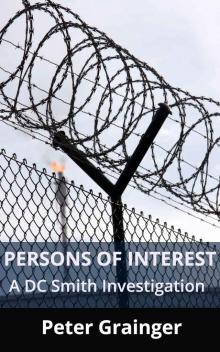 Persons of Interest
Persons of Interest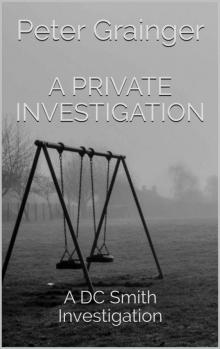 A Private Investigation
A Private Investigation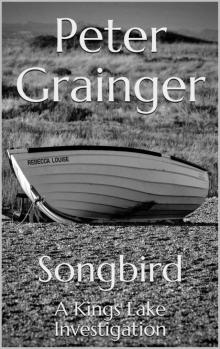 Songbird
Songbird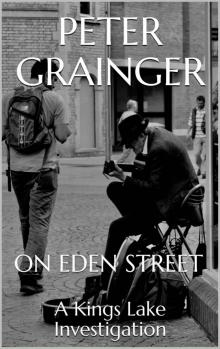 On Eden Street
On Eden Street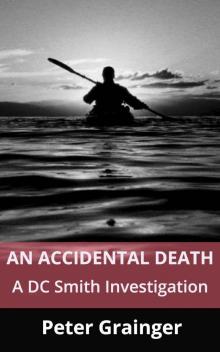 An Accidental Death
An Accidental Death Time and Tide
Time and Tide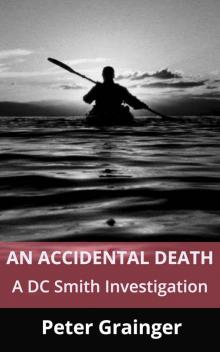 An Accidental Death: A DC Smith Investigation
An Accidental Death: A DC Smith Investigation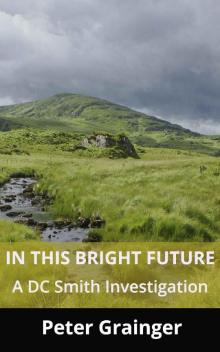 In This Bright Future
In This Bright Future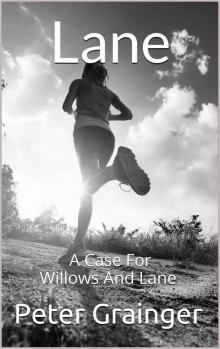 Lane: A Case For Willows And Lane
Lane: A Case For Willows And Lane The Rags of Time: A DC Smith Investigation
The Rags of Time: A DC Smith Investigation Luck and Judgement
Luck and Judgement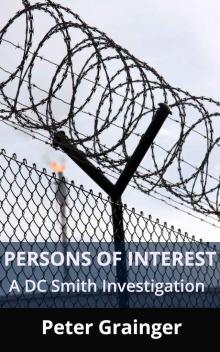 Persons of Interest: A DC Smith Investigation
Persons of Interest: A DC Smith Investigation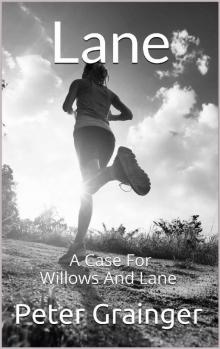 Lane
Lane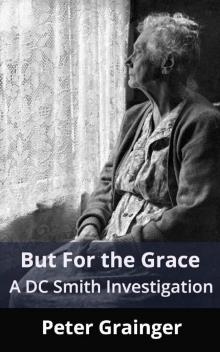 But For The Grace
But For The Grace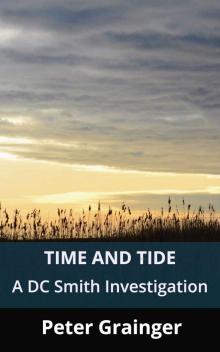 Time and Tide: A DC Smith Investigation
Time and Tide: A DC Smith Investigation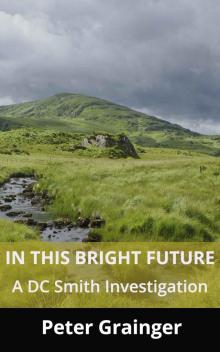 In This Bright Future: A DC Smith Investigation
In This Bright Future: A DC Smith Investigation The Rags of Time
The Rags of Time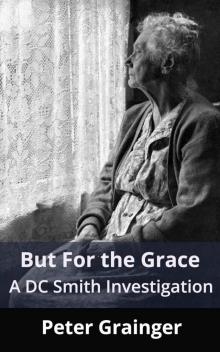 But For The Grace: A DC Smith Investigation
But For The Grace: A DC Smith Investigation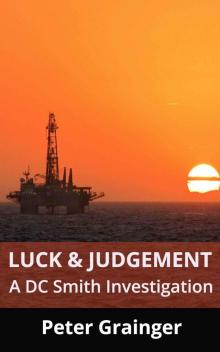 Luck and Judgement: A DC Smith Investigation
Luck and Judgement: A DC Smith Investigation